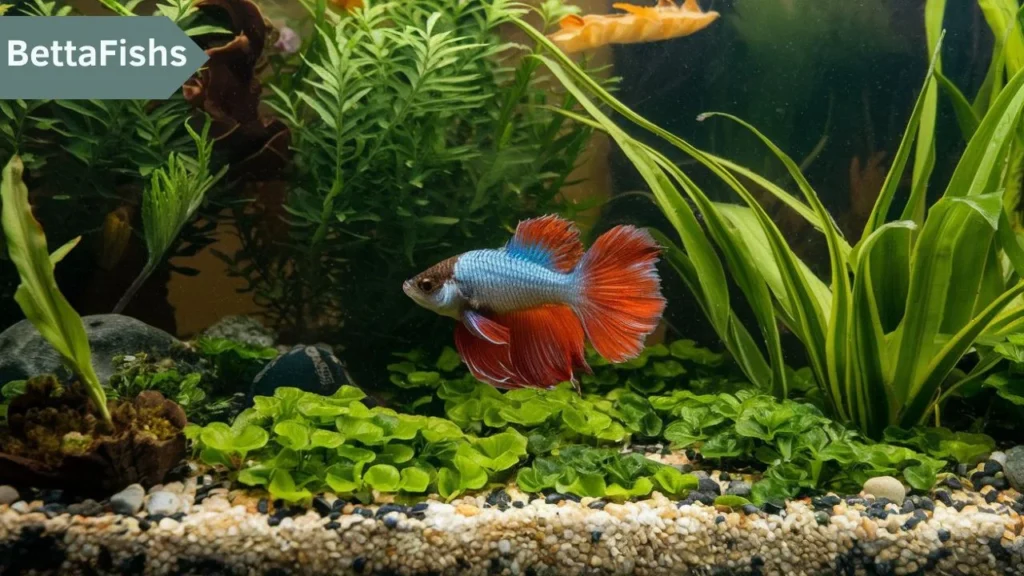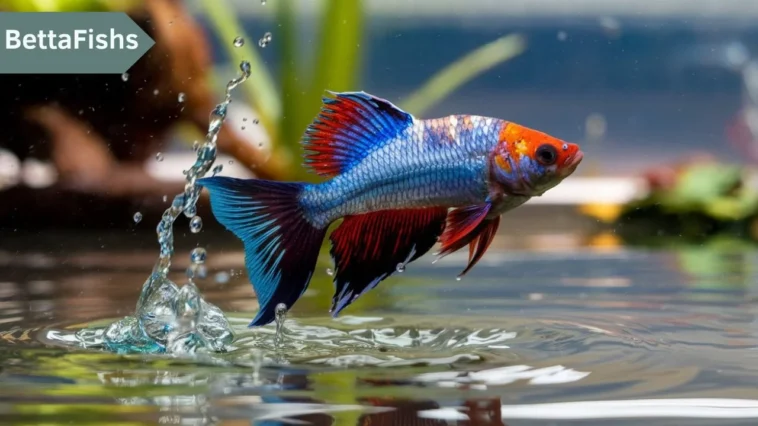Betta fish are known for their vibrant colors, flowing fins, and feisty personalities. But did you know that these little swimmers are also quite the jumpers? Many people are surprised to learn that betta fish have a natural inclination to leap out of the water. This can be both fascinating and a bit concerning for aquarium owners. So, how high can betta fish jump, and what can you do to keep them safe? Let’s dive into the world of betta fish and explore their jumping behavior. In this article, we cover ” How high can Betta fish jump? ” in detail.
What Are Betta Fish?
Betta fish, scientifically known as Betta splendens, originate from the shallow waters of Southeast Asia, particularly Thailand, Cambodia, and Vietnam. They are found in rice paddies, ponds, and slow-moving streams. These fish are known for their aggressive nature, especially males, which is why they are also called Siamese fighting fish. With their brilliant colors and striking fin shapes, bettas have become popular pets around the world.
Why Do Betta Fish Jump?
Betta fish jump for various reasons, many of which are instinctual. In the wild, bettas might jump to escape predators, find food, or move to another body of water if their current environment becomes inhospitable. In aquariums, similar instincts can kick in, causing them to leap out of the water. Stress, poor water quality, lack of space, or even curiosity can prompt a betta to jump. Sometimes, it’s just their way of exploring the world beyond their tank.

How High Can Betta Fish Actually Jump?
Aquarists and betta enthusiasts have observed that these fish can jump quite high relative to their size. A healthy betta can leap up to 2 to 3 inches above the water’s surface. In some cases, bettas have been known to jump even higher, especially if they are startled or trying to reach something just outside their tank. The height a betta can jump often depends on its health, energy levels, and motivation.
Is Jumping Dangerous for Betta Fish?
While jumping is a natural behavior, it can be dangerous for bettas in captivity. If a betta fish jumps out of its tank, it can lead to injury, stress, or even death. Bettas have a labyrinth organ that allows them to breathe air directly, which means they can survive out of water for a short period. However, being out of water for too long can dry out their skin and gills, leading to suffocation. Immediate action is required if a betta jumps out of its tank to ensure its survival.
Common Triggers for Betta Fish Jumping
Several factors can trigger jumping behavior in betta fish:
- Environmental Factors: Changes in water quality, temperature, or lighting can stress bettas, prompting them to jump.
- Stress and Fear: The presence of other aggressive fish or sudden movements can scare bettas into leaping out of the water.
- Curiosity and Exploration: Bettas are naturally curious creatures. They might jump to explore their surroundings or chase after a reflection or shadow.
How to Prevent Your Betta Fish from Jumping
Preventing your betta fish from jumping requires a few simple measures:
- Use a Lid or Cover: The most effective way to prevent jumping is by using a secure lid or cover for your aquarium. Make sure it’s breathable and allows proper air circulation.
- Maintain Optimal Water Conditions: Regularly check and maintain water quality, temperature, and pH levels. Consistent conditions will keep your betta healthy and less likely to jump due to stress.
- Provide a Safe and Stimulating Environment: Add plants, decorations, and hiding spots to your aquarium. This will make your betta feel secure and less inclined to explore outside the tank.
Aquarium Design Considerations
The design and setup of your aquarium play a crucial role in preventing betta fish from jumping:
- Size and Shape of the Aquarium: A larger tank gives bettas more space to swim and explore, reducing the urge to jump. Opt for an aquarium that is at least 5 gallons or larger.
- Plants and Decorations: Adding live or artificial plants can provide hiding spots and make the tank feel more natural for your betta.
- Safe Hiding Spots: Betta fish appreciate having places to hide when they feel stressed. Caves, driftwood, and other decorations can offer them comfort.
Behavioral Signs to Watch For
Monitoring your betta’s behavior can help you identify if something is wrong:
- Signs of Stress: Faded colors, clamped fins, or erratic swimming could indicate stress, which might lead to jumping.
- Signs of Illness: Lethargy, loss of appetite, or white spots could be signs of illness. A sick betta may jump due to discomfort.
- Normal vs. Abnormal Jumping: Occasional jumping during feeding or play is normal. Frequent or frantic jumping might signal a problem.
The Role of Diet in Betta Fish Behavior
What you feed your betta can impact its behavior:
- Nutritional Needs: Bettas require a diet rich in protein, which they get from insects and larvae in the wild. High-quality betta pellets, live or frozen foods, can meet these needs.
- How Diet Affects Behavior: Poor nutrition can lead to health issues, making bettas more prone to stress and jumping.
- Feeding Tips: Feed your betta small portions two to three times a day. Overfeeding can lead to water quality issues, indirectly causing stress.
Maintaining a Safe Environment for Betta Fish
Consistent care is key to keeping your betta safe and happy:
- Regular Cleaning and Maintenance: Clean the tank regularly to prevent the buildup of toxins.
- Monitoring Water Parameters: Test water regularly for ammonia, nitrites, nitrates, and pH levels.
- Importance of Consistent Care: A stable environment minimizes stress and reduces the likelihood of jumping.
Do All Betta Fish Jump?
Not all betta fish exhibit jumping behavior. Some are more prone to jumping due to their individual personality, species variations, or environmental factors. Observing your fish and understanding its unique behavior can help you tailor your care approach.

Training Betta Fish to Jump (Safely)
Believe it or not, some betta owners train their fish to jump on command, often as part of feeding time:
- Can Betta Fish Be Trained? Yes, bettas can be trained using positive reinforcement techniques.
- Steps to Safely Train Betta Fish: Start by holding a food pellet just above the water surface. Gradually increase the height as your betta learns to jump for the food.
- Ethical Considerations: Always prioritize the health and safety of your betta. Avoid encouraging excessive jumping, which can lead to stress or injury.
Fun Facts About Betta Fish
- Betta fish can recognize their owners and may swim to the front of the tank to greet them.
- They have a special labyrinth organ that allows them to breathe air directly from the surface.
- In some cultures, betta fish have been kept for centuries and were used in traditional fighting competitions.
Conclusion
Betta fish are fascinating creatures with a lot of personality packed into their small bodies. While their jumping ability is impressive, it also comes with risks. Why bettas jump and take steps to prevent dangerous leaps, you can ensure your betta stays safe, healthy, and happy in its aquarium. Remember, a well-cared-for betta is less likely to jump, so focus on providing the best possible environment for your friend.
FAQs
How often do betta fish jump?
Betta fish may jump occasionally, especially during feeding or if they’re startled. However, frequent jumping could indicate stress or environmental issues.
Can betta fish jump higher than other fish?
Betta fish are known to jump higher than many other aquarium fish, thanks to their strong muscles and instinctual behavior.
What should I do if my betta fish jumps out of its tank?
If your betta fish jumps out, gently pick it up using a soft net or your hand and place it back into the water immediately. Monitor it for any signs of injury or stress.
Is it normal for betta fish to jump during feeding?
Yes, some betta fish may jump out of excitement during feeding, especially if they’re used to being fed at the surface.
Are there other types of fish that jump like bettas?
Yes, many fish species, such as guppies and goldfish, are also known to jump. However, bettas are particularly notorious for their jumping behavior.





One Comment
Leave a ReplyOne Ping
Pingback:Do Betta fish hibernate?